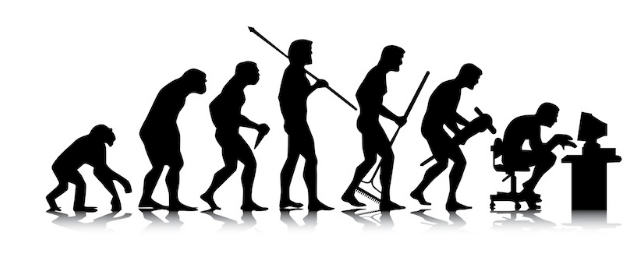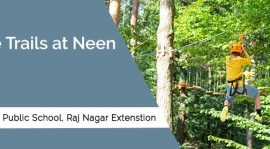Posted on Dec 30, 2016 in STEM in the Outdoors
1 Comment

Can you imagine a single day without reading the news or travelling in a vehicle or drinking clean water. Can you imagine a day without electricity or without medicine when you fall sick. Can you imagine not wearing clothes or shoes and going on a hunt for animals in the jungle every time you feel hungry. Not in today’s date. This is our currently reality. If I need food within the next hour, I can simply order it online. I can track it’s progress while on it’s way and I can tell a person 350 km above the surface of Earth about its taste. This is our current reality. Everything is just a phone tap away. Just about a generation back, people barely had electricity in their homes. We have evolved and this is daily routine.
From single cell organisms to complex biological machines, the journey for life on Earth has been a long one Humans undoubtedly are the most powerful species on the planet earth. We definitely didn’t start out like that, but we evolved faster and better than anyone else in our time. Our species has reached a state, where we are not only conscious of our place in the Universe but are actively probing into means and reasons for life to exist in the first place.

We have the ability to gather immense amount of data, process complex problems and arrive at solutions. This dynamic ability of our brain enables us to record our thoughts in form of art, music,language and literature.
The human brain can grow only up to a limited size. As the humans evolved, so did our ability to express ourselves and for evolution to continue and for us to extend our growth beyond our physical limits, we had to take the help of Science, Technology, Engineering and Mathematics (STEM) to keep our minds emptier, gives us more mental space to organise ourselves, imagine more and create more.
 In the last century and a half, we have come so ahead of ourselves that we have started delegating tasks to machines, which without any questions do our tasks relentlessly (or at least till the time they conk out). While NASA’s space program was being developed, several technologies were developed which spinned off solutions for the masses. In rural areas all across the world, millions of people can now drink safe water from almost any source they find. Fluid recycling techniques give dialysis patients a hope as blood transfusion and filtering techniques have improved. Deep sea dives by the likes of James Cameron have given Alzheimers research a boost. Athletes can now run faster because of the technology borrowed from Astronauts space suits and highly efficient solar panels can provide pollution free electricity for shoestring rates. Clocks use quartz crystal to give accurate time making our life smoother, while cordless devices keep everything within our reach now. These are only a few examples of how just one organisation has benefited us immensely. We built a society where machines became a need and not just a want and if we wouldn’t have taken the help of STEM, our progress would have been really really slow and you wouldn’t have been reading this article perhaps.
In the last century and a half, we have come so ahead of ourselves that we have started delegating tasks to machines, which without any questions do our tasks relentlessly (or at least till the time they conk out). While NASA’s space program was being developed, several technologies were developed which spinned off solutions for the masses. In rural areas all across the world, millions of people can now drink safe water from almost any source they find. Fluid recycling techniques give dialysis patients a hope as blood transfusion and filtering techniques have improved. Deep sea dives by the likes of James Cameron have given Alzheimers research a boost. Athletes can now run faster because of the technology borrowed from Astronauts space suits and highly efficient solar panels can provide pollution free electricity for shoestring rates. Clocks use quartz crystal to give accurate time making our life smoother, while cordless devices keep everything within our reach now. These are only a few examples of how just one organisation has benefited us immensely. We built a society where machines became a need and not just a want and if we wouldn’t have taken the help of STEM, our progress would have been really really slow and you wouldn’t have been reading this article perhaps.
As a civilization we are totally committed towards increasing our chances of survival and perhaps meeting extra terrestrials better known as ‘Aliens’. Whether that time comes sooner or later, we will still be busy keeping our best foot forward and from being a collaborative society we will someday turn into a collaborative civilization. We are destined to move away from our planet one day and find a new home for all of us. All of this will not just come on its own or in a flash. Little steps will pave the way towards progress and the first step will be accepting the fact that Science is not just a subject, it is evolution of humankind.
Rishabh Jain: Popularly known as ‘astronomy guru’ to friends and colleagues, Rishabh has an asteroid discovery to his credit. From computer language, he moved to the language of astronomy and astrophotography, his work having featured on BBC Earth and Universe Today. He writes on the subjects of science and technology, and conducts science based programs at EdTerra.

We were mesmerised as...

Rugby School truly exemplified...

We, the students of...

There is nothing quite...

There is a famous...

We, the students of...

It is best to...

Nainital, known as the...

The story of Jallianwala...

We felt that the...
See What Our Edventurers Experience!